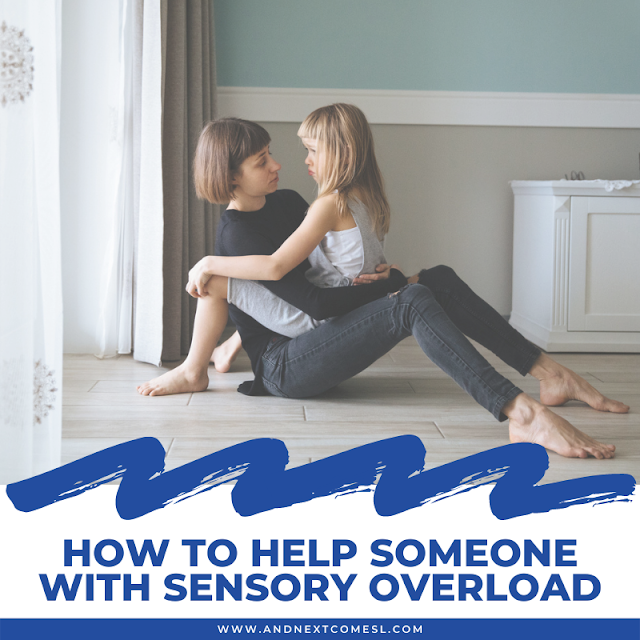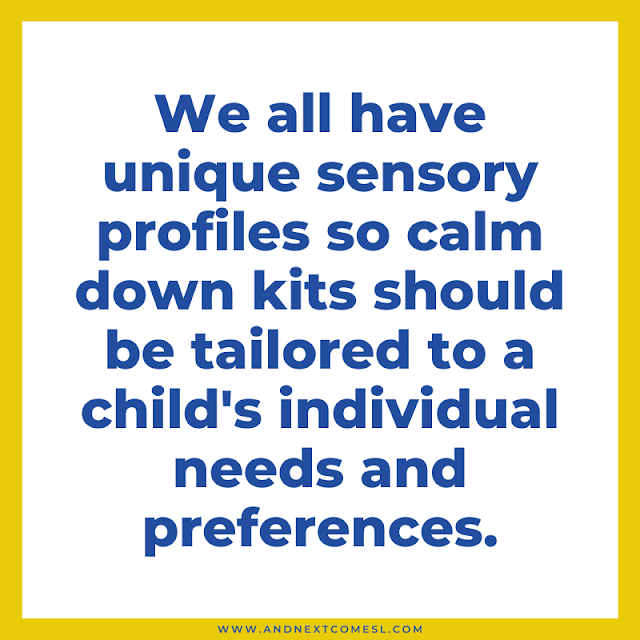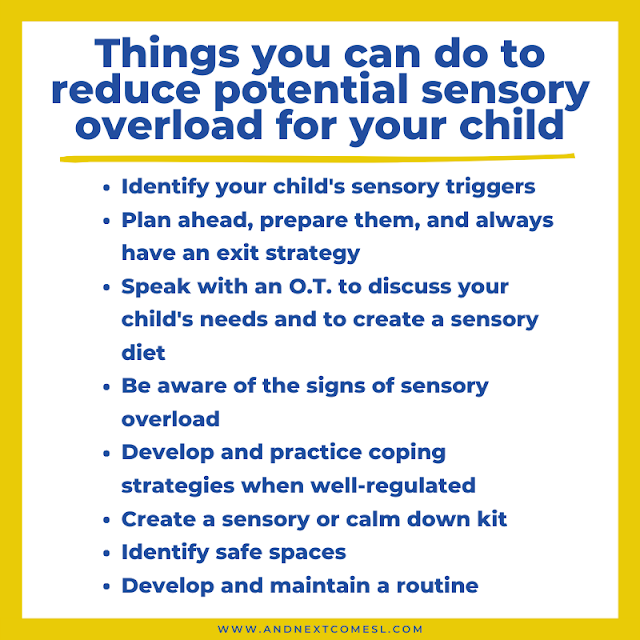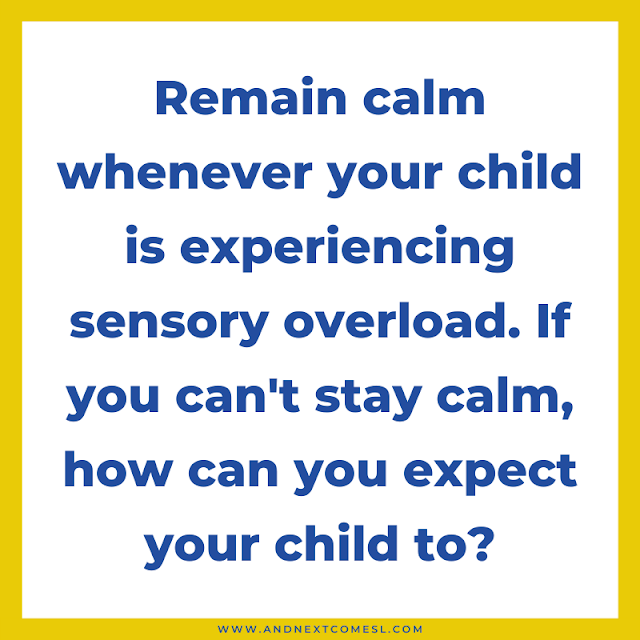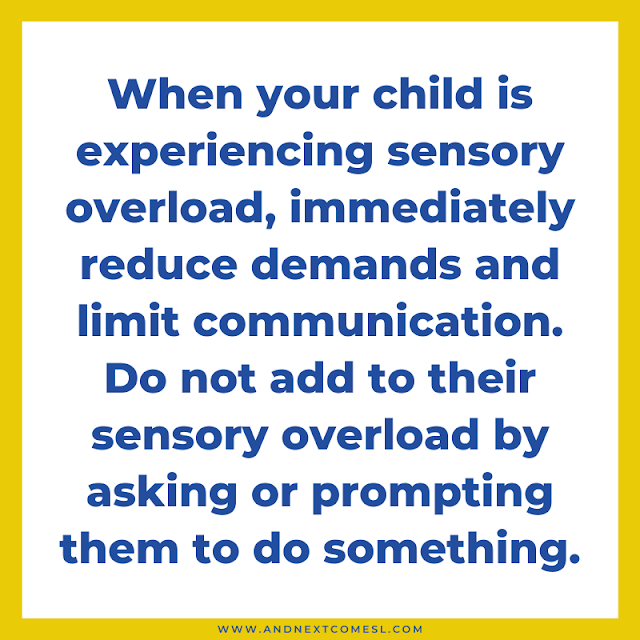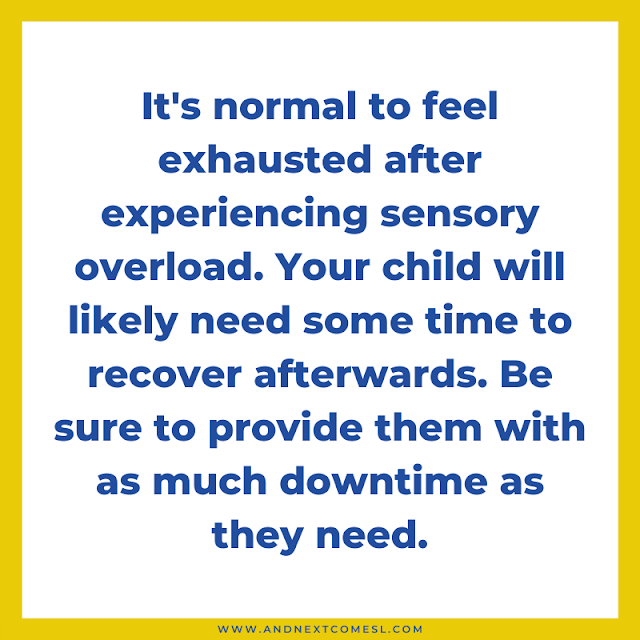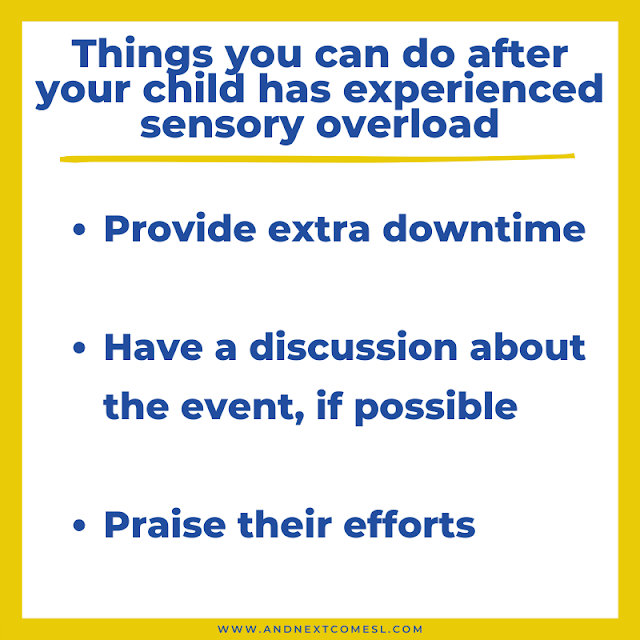Sensory overload can happen when any of our 8 sensory systems get overwhelmed or bombarded by sensory input. Too much input and that sensory overload could quickly escalate, turning into a full blown sensory meltdown.
Knowing what sensory overload is in the first place can help.
So can knowing what the common signs of sensory overload are.
But what do you do in the actual moment to help someone dealing with sensory overload? What can you do to de-escalate and reduce the likelihood of a sensory meltdown? That's what you really want to know, right?
Well, that's what we'll cover here. You'll learn tips and strategies for how to help someone with sensory overload, whether that someone is your sensory avoiding or sensory sensitive child, a student with sensory processing disorder in your classroom, or even just yourself.
How to Help Someone with Sensory Overload: Tips & Strategies You Have to Try!
There are a variety of things you can do to help someone cope or deal with sensory overload before, during, and after an event. So I've organized the tips in that manner.
Before: Preventative Measures You Can Take to Reduce Potential Sensory Overload for Your Child
Well before sensory overload happens, you can lay some groundwork and put some preventative measures in place.
Doing a little bit of work ahead of time can help reduce the likelihood of sensory overload. It can also give your kids the chance to learn - and practice! - the skills they need to cope and manage all of the sensory information they receive.
Here are some suggestions of what can be done ahead of time to reduce the likelihood of a sensory overload experience:
1. Identify your child's sensory triggers
Do you know what types of sensory experiences tend to overwhelm your child? Are there certain experiences or environments where your child experiences frequent sensory overload? Is it loud noises? Large crowds? Bright lights? Smelly perfumes? Busy stores? Scratchy tags in clothing? Those darn hand dryers in public washrooms?
Sure there are things that might cause random sensory discomfort for your child, but there are usually consistent regular sensory triggers that you can watch out for.
So consider all past experiences where your child has had a sensory overload reaction or faced other sensory challenges. Are there any common sensory overload triggers that you can pinpoint?
Once you know what your child's sensory triggers are, it's much easier to know how to help support your child, which situations might be more difficult for them to handle, which sensory stimuli to avoid or seek out, what signs to watch out for, etc.
2. Plan ahead, prepare them, and always have an exit strategy
If there is something coming up that might be overwhelming or might present possible sensory challenges for your child, it's best to plan ahead and prepare them.
Let them know what to expect, things they can do to cope with sensory input, what the exit strategy will be if things become too much, what signs to watch out for, and/or anything else that might be relevant.
Once you've gone over the plan, then make sure they have the tools they need to get through it. Give them tools to manage and cope with their sensory processing issues.
For instance, if they're going to the mall with you and they find the mall too noisy, plan to keep the trip short or stick to a specific time frame, pack ear defenders, offer frequent sensory breaks, and come up with a phrase or key word that they can use when they're all done and want to go home.
It's also important to have an exit strategy. What will you do when it's clear that it's too much for your child? What will be the sensory signals that tell you it's time to go? Discuss those options ahead of time.
3. Speak with an occupational therapist to discuss your child's needs and to create a sensory diet
An occupational therapist can help you with your child's sensory needs and can offer up great suggestions for sensory activities to try. You can use their suggestions and guidance to help your child manage and cope with sensory overload.
4. Be aware of the signs of sensory overload
Always be looking out for possible signs of sensory overload, no matter how subtle they might be. Maybe you notice your child is covering their ears or they are looking down at their feet, trying to avoid the bright lights.
Check in with them and see if they need to use one of their coping strategies. Ignoring these signs could mean that sensory overload or a meltdown are right around the corner. Spotting them early means you could avoid potential overload.
5. Develop and practice coping strategies when well-regulated
You should always teach coping strategies when a child is well-regulated, not in the middle of sensory overload. Maybe you practice doing deep breathing before bedtime. Maybe you practice counting backwards from 10 to 0 using the free calm down hero story. Practicing these skills ahead of time makes it easier to implement when they're needed the most.
6. Create a sensory or calm down kit
A calm down kit is a great way to help kids manage their sensory overload as it offers up a place for them to find tools and items that they find helpful for self-regulation. The calm down kit should be tailored to their individual needs and preferences and it should be easily accessible to your child.
It can include a variety of different sensory toys, fidgets, or other tools that help with sensory integration.
Not sure what to put in your child's calm down or sensory overload kit? Try this list of ideas for kids or this list for older kids.
7. Identify safe spaces
Where can your child go when they are feeling too much sensory stimulation at home? How about at school? Or when they're at their friend's birthday party? Who can they talk to and trust?
Identifying safe spaces - and people! - ahead of time can be helpful because it teaches your child that they do have somewhere they can go to relax and regulate. It also let's them know that they have trusted people they can seek help from. Basically, you're identifying places and people they can depend on when experiencing sensory overload symptoms.
These safe spaces might be consistent like a calm down corner or they might vary depending on the situation. So be sure to discuss safe spaces with your child during the planning stage. That way they know where they can escape to when experiencing overwhelming sensory issues.
8. Develop and maintain a routine
Sometimes sensory overload can result from changes in a routine. Try to keep your routine consistent and/or at least warn your child ahead of time of any changes in plan.
During: Things You Can Do When Your Child is Experiencing Sensory Overload
Sometimes sensory overload is inevitable. Here's what you can do when your child is experiencing sensory overload:
1. Remain calm
First things first, remain calm whenever your child is experiencing sensory processing overload. If you can't stay calm, how can you expect your child to? Take a few deep breaths before attempting to help your child.
2. Try to minimize sensory input
Minimizing sensory input might mean giving them a sensory tool such as ear defenders. Or it might mean removing your child from the situation or area completely by retreating to a safe space. It might mean turning down or turning off the music or dimming the lights.
Basically, find ways to reduce or remove the amount of sensory input that your child is receiving.
3. Take breaks or shorten the event or experience
Maybe your child is showing signs of sensory overload, but is still managing okay for the time being. In these instances, it might be best to take a break or agree to end things early.
Take a quick five minute sensory break to reset. It could be all they need to continue with the event or experience. Or if what you are doing isn't overly important, then simply end things early. Time to use your exit plan!
4. Immediately reduce demands and limit communication (aka stop talking!)
It's clear they're overwhelmed and receiving more sensory stimulation they can handle. So the last thing they need is you peppering them with questions, prompting them, or telling them to "calm down!" That last one is not helpful at all, by the way. It doesn't magically calm your child's sensory processing challenges to utter those words...
One of the best things you can do when sensory processing issues show up is to stop talking. Or, at the very least, limit the amount of talking.
Sitting quietly with your child and showing them that you are there for them is all that your child might need at the moment. Just please do not add to their sensory overload by asking or prompting them to do something. Now is not the time for talking or additional demands.
5. Protect them from danger or injury
When experiencing sensory overload, some kids might get aggressive or try to escape, often leaving themselves or others in danger. Your job is to make sure they are safe at all times so remove them from the situation if you can. Then find a safe space for your child to regulate and calm down, which leads me to my next point.
6. Give them time to regulate and calm down
Sometimes there's not much else you can do during these sensory heavy situations except wait it out. Remember how I said sit quietly and don't talk? Well, the goal with doing those two things is to give your child time to regulate and calm down on their own. Try to give them as much time as they need to regulate and don't try to rush it.
After: Things You Can Do After Your Child Has Experienced Sensory Overload
Here are some strategies to try after the stressful sensory event:
1. Provide extra downtime
It's normal to feel exhausted after experiencing sensory overload. As a result, your child will likely need some time to recover afterwards. That might mean some quiet time, a nap, deep pressure, watching a favorite show, listening to music...anything that they might find helpful for decompressing after a stressful situation. Be sure to provide them with as much downtime as they need.
2. Have a discussion about the event, if possible
Eventually, you should have a conversation about what happened with your child if you can (and if they are willing to discuss it). This conversation should not happen during or immediately after they experience overload. Instead, it should happen when they are well-regulated and calm, after time has passed.
The basic idea is to discuss what happened, pinpoint any triggers or sensory overload signs that were missed, things that went well such as strategies that worked, things that did not go well, possible strategies to try for next time, or whatever else might be relevant.
The point here is to look for clues as to what could have been done better (if possible), what was learned (if anything), identify any new triggers (if applicable), and/or come up with plans for how to handle similar situations in the future. Essentially, you're looking for ways to help your child with future sensory overload responses.
3. Praise their efforts
After experiencing sensory overload or even a full meltdown, your child might experience a variety of feelings. They might feel embarrassment, shame, guilt, or sadness. Feelings like these can be part of the reason why they might not want to discuss what happened so be mindful of that.
However, it's important to praise their efforts and acknowledge what went well though. Perhaps they told you they needed a break or that it was too noisy. Point out how they did that. Or maybe they did a good job with their deep breathing while you helped them exit the situation.
Taking a quick minute or two to praise their efforts will help them recognize and validate what works, building confidence that they can use those same strategies again in future situations.
Finally, remind them that you love and support them no matter what and that you are there to help them. Sometimes sensory sensitive children need to hear that more often.
A Recap of Tips & Strategies for Sensory Overload
Whether you're a skim reader or just want a nice recap, here's a summary of the tips and strategies for sensory overload that were outlined above.
Preventative measures you can take beforehand to help your child with their sensory processing issues:
- Identify your child's sensory triggers
- Plan ahead, prepare them, and always have an exit strategy
- Speak with an occupational therapist to discuss your child's needs and to create a sensory diet
- Be aware of the signs of sensory overload
- Develop and practice coping strategies when well-regulated (not when they're experiencing sensory processing issues)
- Create a sensory or calm down kit filled with helpful sensory toys or tools that are tailored to your child's unique sensory needs and preferences
- Identify safe spaces for your child to retreat to when dealing with sensory processing problems (identify safe people too!)
- Develop and maintain a routine
Things you can do during the moment of sensory overload:
- Remain calm
- Try to minimize sensory input
- Take sensory breaks or shorten the event or experience
- Immediately reduce demands and limit communication (aka stop talking!)
- Protect them from danger or injury
- Give them time to regulate and calm down
Things to do afterwards:
- Provide extra downtime
- Have a discussion about the event, if possible
- Praise their efforts
Hopefully you found these tips and suggestions for how to help someone with sensory overload helpful!
Other Sensory Overload Related Resources You'll Love
What are the 8 Sensory Processing Systems? Your 8 Senses Explained


